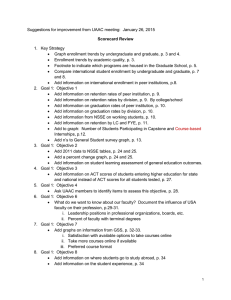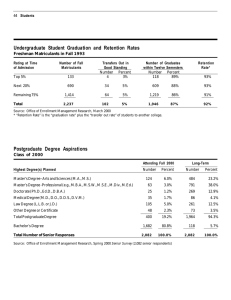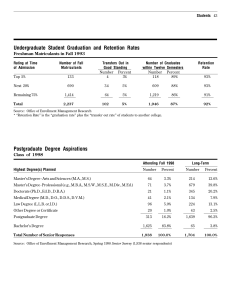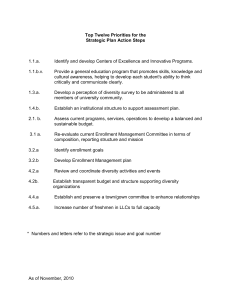2009-2014 Strategic Plan
advertisement
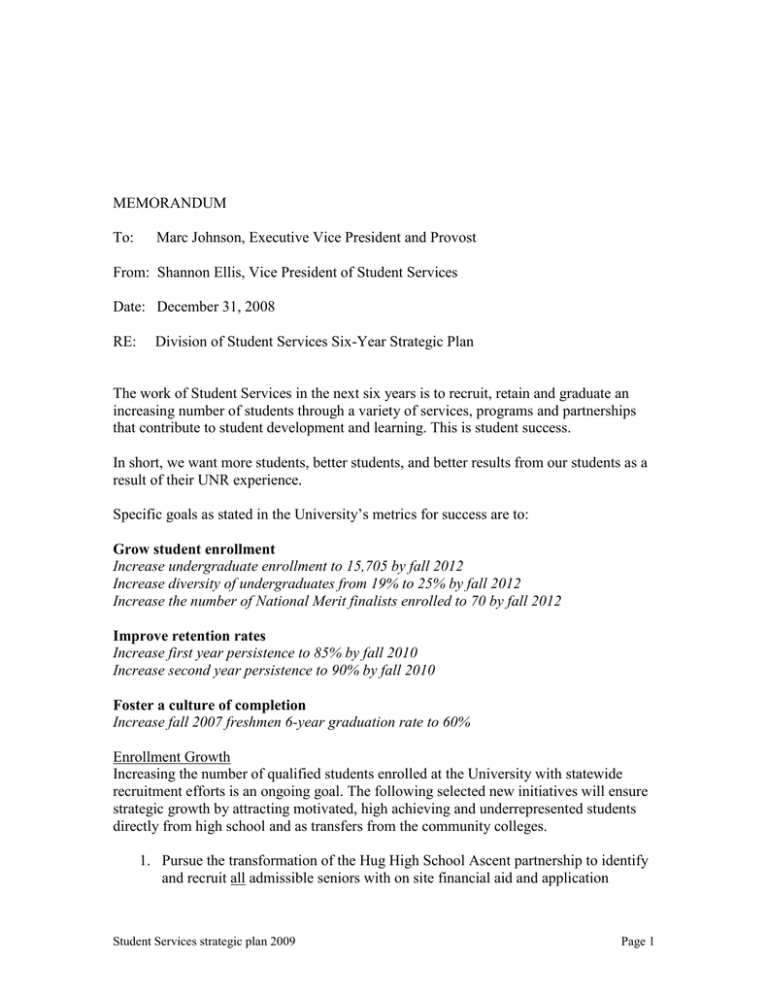
MEMORANDUM To: Marc Johnson, Executive Vice President and Provost From: Shannon Ellis, Vice President of Student Services Date: December 31, 2008 RE: Division of Student Services Six-Year Strategic Plan The work of Student Services in the next six years is to recruit, retain and graduate an increasing number of students through a variety of services, programs and partnerships that contribute to student development and learning. This is student success. In short, we want more students, better students, and better results from our students as a result of their UNR experience. Specific goals as stated in the University’s metrics for success are to: Grow student enrollment Increase undergraduate enrollment to 15,705 by fall 2012 Increase diversity of undergraduates from 19% to 25% by fall 2012 Increase the number of National Merit finalists enrolled to 70 by fall 2012 Improve retention rates Increase first year persistence to 85% by fall 2010 Increase second year persistence to 90% by fall 2010 Foster a culture of completion Increase fall 2007 freshmen 6-year graduation rate to 60% Enrollment Growth Increasing the number of qualified students enrolled at the University with statewide recruitment efforts is an ongoing goal. The following selected new initiatives will ensure strategic growth by attracting motivated, high achieving and underrepresented students directly from high school and as transfers from the community colleges. 1. Pursue the transformation of the Hug High School Ascent partnership to identify and recruit all admissible seniors with on site financial aid and application Student Services strategic plan 2009 Page 1 workshops, and a specific Nevada Bound campus visit. Continue to mentor sophomore students in an effort to help them become “college ready.” 2. Partner with other divisions in the aggressive recruitment of 10 National Merit finalists each year and increase enrollment of other “26ers” through impressive scholarship offerings as well as active phone calling, home visits by academic faculty and targeted campus visit programs. 3. Increase the number of Pell grant students by 10% each year through assertive marketing of the Pack Advantage program launched in September, 2008. Currently 1,552 Pell students are enrolled. 4. Develop and implement a co-admission program with TMCC to ensure more students complete their AA/AS degree and make a smooth transition to UNR. 5. Clearly delineate the duties and responsibilities of the Transfer Center and Academic units in the recruitment and admission of transfer students. Work cooperatively to insure timely course evaluation, articulation and advisement of new transfer students. 6. Increase the number of students of color in the entering freshmen class with targeted recruitment to the Black Scholars program in southern California, the Nevada Indian Commission Education Committee and Hispanic Youth Leadership groups. 7. Commit to a three year expansion of the geographic recruiting area to out of state markets (full pay, non-residents) to be assessed for cost effectiveness. 8. Develop a long term fundraising strategy that will address the inevitable demise of the millennium scholarship program which will impact enrollment. Over 70% of the entering freshman class are Millies and typically over 80% retain eligibility. 9. Apply for the federal Talent Search grant in 2009 to increase low income, first generation students who are college ready. The program identifies and assists individuals from disadvantaged backgrounds who have the potential to succeed in higher education. 10. Expand current efforts to enroll more returning veterans and provide the necessary services to help them succeed. Increase Retention A number of effective retention programs for small cohorts of students exist within Student Services and the University. Increasing the retention of all students in the next six years will only be accomplished in partnership with every other area of the institution. Our work must be to create the conditions that are common to effective educational practices. These include campus engagement, advice and intervention, integrated curricular and co-curricular experiences and clearly marked pathways to student success. Program Development 1. Align and integrate curricular and co-curricular programs and services into a series of retention initiatives throughout a student’s first-year to be coordinated by the Director, New Student Initiatives. Student Services strategic plan 2009 Page 2 2. Redesign and implement a new student orientation program that focuses on student success and increased retention. 3. When resources are restored, create an intensive set of year-long success initiatives for sophomores with a focus on persistence to the junior year. 4. Complete the design and construction of a new living/learning residence hall with classroom space, complementary course offerings and teacher offices. Expand living/learning communities to all academic colleges to fully utilize the new facility. 5. Partner with Academics to analyze and apply the results of the spring 2009 Supplemental Instruction (S.I.) initiative. The results will determine the future use of S.I. in improving student success. 6. Collaborate with ASUN to develop a campus-wide leadership development program for all students and organizations. Intervention 7. Develop an early warning process in partnership with Academics. This would include effective intervention steps for new students identified as “at-risk” for failing or dropping out. 8. Secure enough student access dollars each year to continue to increase financial aid to students proportionate to the increases in tuition and fees for both undergraduate and graduate students. 9. Create an effective intervention strategy to retain Clark County and California freshmen. These groups have a 68% and 70% fall to fall retention rate as opposed to the 75% rate for all first-year students and 79% for all other Nevadans. 10. Partner with Information Technology in the successful implementation of the iNtegrate Student Information System which will replace fragile, outmoded and defunct software for enrollment services functions to graduate and undergraduate students. 11. Design and implement effective retention strategies for new freshmen of color particularly those ethnicities which experienced a decline from the prior year (Black non-Hispanic and Hispanic/Latino freshmen). 12. Develop and implement a strategy to accommodate the increasing numbers of students with psychological disabilities. Increase Graduation We aspire to graduate more students than might be predicted due to the educationally effective practices put into place. 1. Create a more effective set of tools for students to use in pursuing a clear pathway to graduation i.e. transformation of the “Graduate From UNR” publication and web page; easily accessible and straightforward course lists leading to graduation from every academic program; creation of an annual report for each student with a percent completion report to graduation, for example, a positive statement, “you are now 40% completed with your degree.” Student Services strategic plan 2009 Page 3 2. Create activities in collaboration with ASUN that distinguish class identification/traditions to establish pride in college completion. 3. Set an expectation of students that they will graduate in a timely manner from UNR. This can be accomplished by advising sessions, speeches, individual conversations, publications and every other opportunity when among students and their families. 4. Create a follow up process for students who “stopout” to keep them tied to the University. 5. Reinvent a career development effort in collaboration with Academics that is innovative and effective. Student Services strategic plan 2009 Page 4
